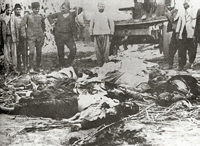Turkey asks USA to reject resolution on genocide of Armenians
Turkey made a final appeal directly to U.S. lawmakers to reject the resolution that declares the World War I-era extermination of hundreds of thousands of Armenians an act of genocide.

The House of Representatives' Foreign Affairs Committee planned a vote Wednesday on the measure that is opposed by the Bush administration.
On Tuesday, Turkish President Abdullah Gul warned of "serious troubles in the two countries' relations" if the measure is approved.
Those threats were coming as Turkey's government was seeking parliamentary approval for a cross-border military operation to chase separatist Kurdish rebels who operate from bases in northern Iraq. The move, opposed by the United States, could open a new war front in the most stable part of Iraq.
In Washington, Turkish members of parliament were making their case on the genocide resolution in meetings Tuesday with members of the committee that will consider the genocide resolution.
"I have been trying to warn the lawmakers not to make a historic mistake," said Egemen Bagis, a close foreign policy adviser to Turkish Prime Minister Recep Tayyip Erdogan.
A measure of the potential problem came in a warning the U.S. Embassy in Ankara issued Tuesday to U.S. citizens in Turkey, a key NATO ally.
"If, despite the administration's concerted efforts against this resolution, it passes committee and makes its way to the floor of the House for debate and a possible vote, there could be a reaction in the form of demonstrations and other manifestations of anti-Americanism throughout Turkey," the statement said.
The basic dispute involves the killing of up to 1.5 million Armenians by Ottoman Turks from 1915-17, an event widely viewed by genocide scholars as the first genocide of the 20th century.
Turkey refuses to call it genocide, saying the death toll has been inflated, and insisting that the Armenians killed were victims of civil war and unrest as the 600-year-old Ottoman Empire collapsed before the birth of modern Turkey in 1923.
Armenian-American interest groups also have been rallying supporters in the large diaspora community to pressure lawmakers to make sure that a successful committee vote leads to consideration by the full House.
The bill seemed to have enough support on the committee for passage, but the majority was slight and some backers said they feared that Turkish pressure would narrow it further. Most Republicans were expected to vote against the resolution.
On Tuesday, Bryan Ardouny, executive director of the Armenian Assembly of America, sought to shore up support in letters to the committee's chairman, Democratic Rep. Tom Lantos of California and its ranking Republican member, Ileana Ros-Lehtinen of Florida.
"We have a unique opportunity in this Congress, while there are still survivors of the Armenian Genocide living among us, to irrevocably and unequivocally reaffirm this fact of history," he said.
The head of the Armenian Apostolic Church, Catholicos Karekin II, was to give the opening invocation to the House's session ahead of the committee vote Wednesday.
Supporters of the measure have been trying to counteract Turkish threats with arguments that Turkish-American relations were too important to Turkey for the Erdogan government to scuttle.
But Turkey's warnings were underscored by its movement toward an incursion into Iraq, which should it occur could seriously upset U.S. efforts to stabilize the country.
Erdogan adviser Bagis said the resolution would make it hard for his government to continue close cooperation with the United States and resist calls from the public to go after the Kurdish rebels who have mounted deadly attacks on Turkish soldiers in recent weeks. Turkey has previously said it would prefer that the United States and its Iraqi Kurd allies in northern Iraq crack down on the Kurdistan Workers' Party, or PKK.
"If the Armenian genocide resolution passes, then I think that the possibility of a cross-border operation is very high," said Ihsan Dagi, a professor of International Relations at Middle East Technical University in Ankara, the Turkish capital.
The United States reiterated on Tuesday its warnings against an incursion.
"If they have a problem, they need to work together to resolve it, and I'm not sure that unilateral incursions are the way to go," U.S. State Department spokesman Sean McCormack said.
Many in the United States also fear that a public backlash in Turkey could lead to restrictions on crucial supply routes through Turkey to Iraq and Afghanistan, and the closure of Incirlik, a strategic air base in Turkey used by the U.S. Air Force.
Bagis, a member of the Turkish Parliament, underscored that possibility.
"Let us not forget that 75 percent of all supplies to your troops in Iraq go through Turkey," he said.
After France voted last year to make it a crime to deny the killings were genocide, the Turkish government ended its military ties with that country.
Subscribe to Pravda.Ru Telegram channel, Facebook, RSS!


